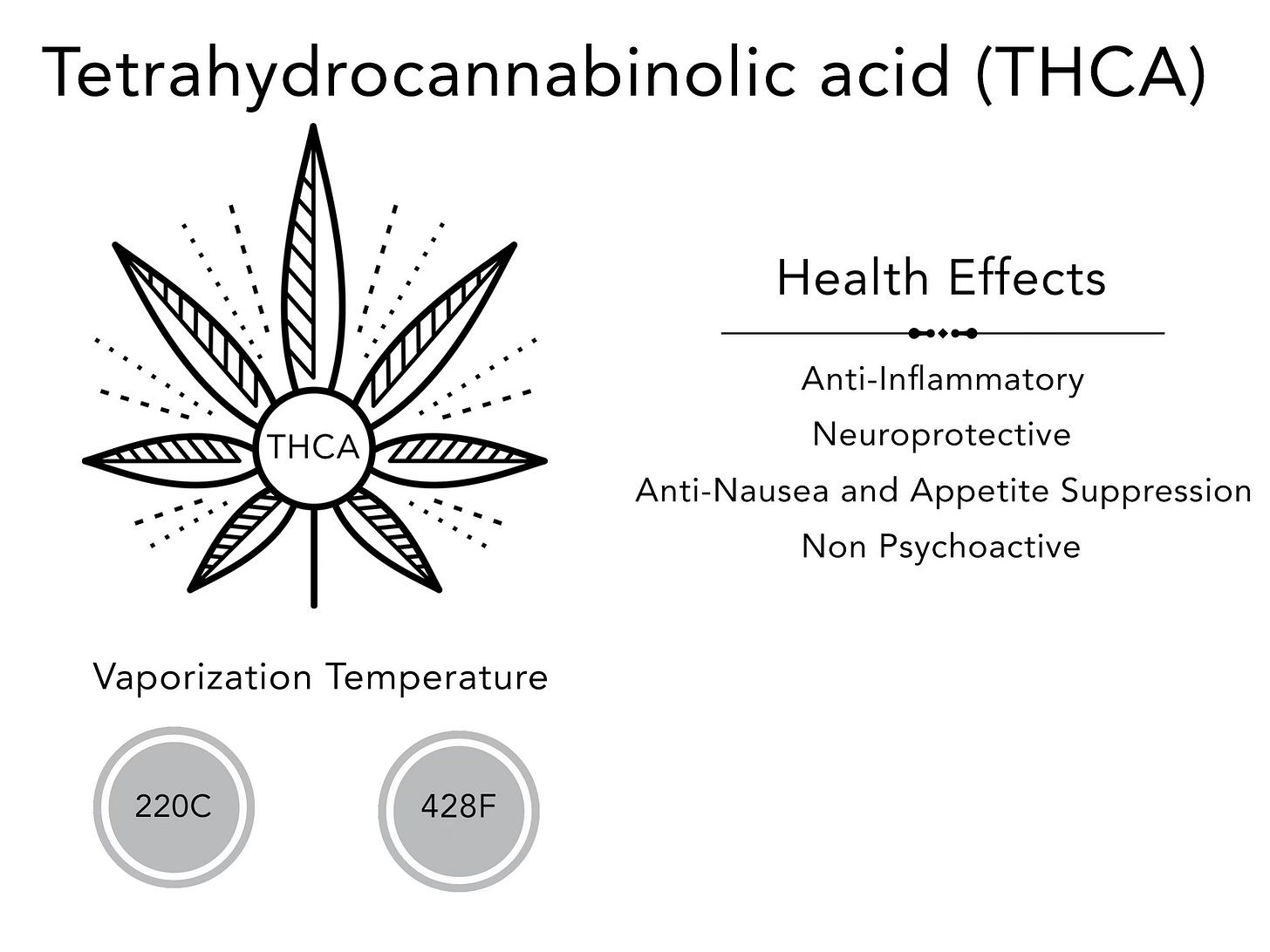Cannabinoid of the Month: Tetrahydrocannabinolic acid (THCA) | AusCannaReviews
This month we’re taking a deeper look at Tetrahydrocannabinolic acid (THCA) a cannabinoid found in raw and unheated cannabis that is gaining interest in the medical community for its potential therapeutic benefits. Unlike its decarboxylated form, THC, which is known for its psychoactive effects, THCA is non-intoxicating.
THCA is the acidic precursor to THC. In the cannabis plant, cannabinoids are initially produced in their acid forms. THCA remains stable until it is exposed to heat through smoking, vaping, or cooking, which converts it to THC through decarboxylation.
For many patients, the appeal of THCA lies in its non-psychoactive nature. Because it does not produce the same intoxicating effects as THC, it offers a way for patients to manage symptoms without impacting their cognitive function or daily activities. This makes it particularly useful for those who need to medicate during the day or for those who are sensitive to the psychoactive effects of THC.
One of the most well-studied aspects of THCA is its potential anti-inflammatory effects. Inflammation is a key factor in many chronic conditions, such as arthritis, inflammatory bowel disease (IBD), and neuroinflammatory disorders. A study on mice published in the June 2020 edition of the British Journal of Pharmacology highlighted THCA’s ability to inhibit pro-inflammatory enzymes like COX-1 and COX-2, suggesting it could be a valuable tool in managing inflammation-driven diseases.
A November 2017 study published in the British Journal of Pharmacology demonstrated that THCA has neuroprotective properties in animal models of neurodegenerative diseases. This study suggested that THCA’s ability to modulate the endocannabinoid system might help protect neurons from damage and degeneration. This could be beneficial in treating conditions like multiple sclerosis (MS), Huntington’s disease and possibly other neurodegenerative and neuroinflammatory diseases.
THCA has also shown promise as an anti-nausea and appetite stimulant. A mini-review article published in 2016 in Frontiers of Pharmacology titled “Cannabinoids As Potential Treatment for Chemotherapy-Induced Nausea and Vomiting” found that THCA effectively reduced nausea and stimulated appetite in animal models, potentially offering relief for patients undergoing chemotherapy or dealing with chronic illnesses that cause loss of appetite.

THCA is a promising cannabinoid with substantial therapeutic potential. Although much of the research is still in the early stages, its anti-inflammatory, neuroprotective, and anti-nausea effects position THCA as a valuable option for patients seeking non-psychoactive relief through medicinal cannabis.
If you’re looking for medicinal cultivars on the Australian market that are high in THCA**…
Levin Health’s Somnus Flower (Total THCA 34.06%)
Phytoca’s Chapel of Love Flower (Total THCA 33.6%)
Grow SB’s White Runtz Flower (Total THCA 33.186%)
Alma Cannabis El Camino’s Santiago Road Flower (Total THCA 30.639%)
Cultiva’s San Fernando Rain Flower (Total THCA 29.8%)
ANTG’s Rocky Flower (Total THCA 29.4%)
Rua Bioscience’s Rua Puawai T26 Flower (Total THCA 26.35%)
ANTG’s Duke Flower (Total THCA 26.1%)
MEDCAN’s Ultra Sour (Ultra01) Flower (Total THCA 25.87%)
Medicabilis BodFlora’s 23 Jealousy Flower (Total THCA 25.757%)
Promethean BioPharama’s OG Cheese Flower (Total THCA 25.463%)
**Information comes from COAs listed on Catalyst by honahlee.
This substack aims to provide anecdotal information from my personal experiences in hopes it will lead to meaningful conversations between my readers and their healthcare professionals about medicinal cannabis.
I have no formal training in medicine or science. This article does not constitute medical advice.




